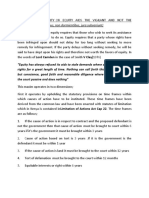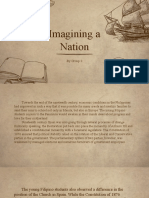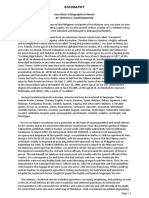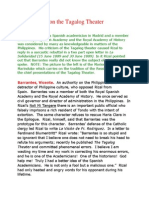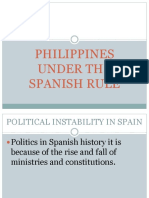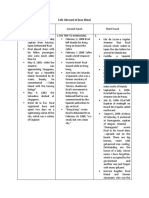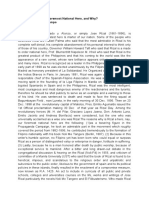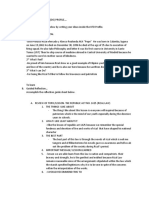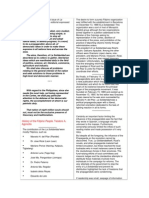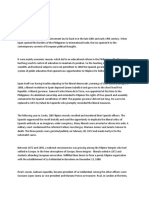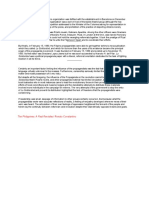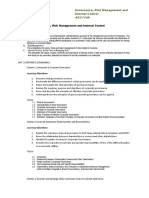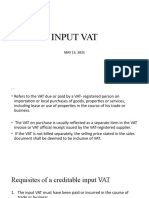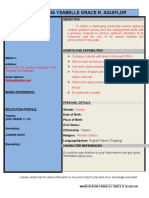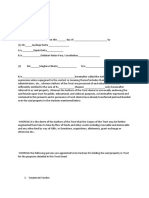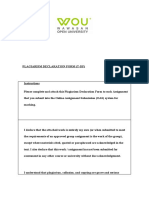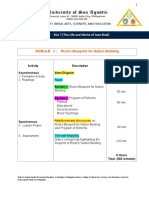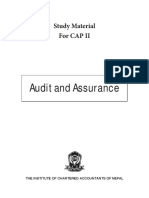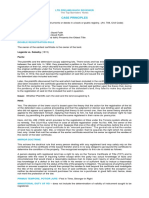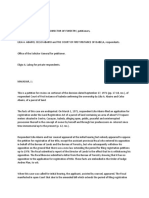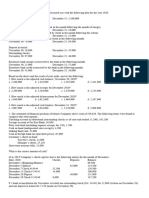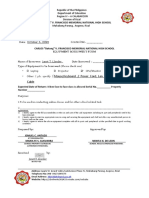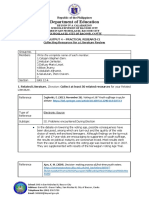Professional Documents
Culture Documents
La Solidaridad
La Solidaridad
Uploaded by
A cOriginal Description:
Copyright
Available Formats
Share this document
Did you find this document useful?
Is this content inappropriate?
Report this DocumentCopyright:
Available Formats
La Solidaridad
La Solidaridad
Uploaded by
A cCopyright:
Available Formats
La Solidaridad
The desire to form a purely Filipino organization was fulfilled with the establishment in Barcelona
on December 13, 1888 if La Solidaridad. This organization was a sort of rival of Morayta's Madrid
group although the two organizations joined together in a petition addressed to the Minister of the
Colonies asking for representation in the Cortes, abolition of censorship of the press, and
prohibition of the practice of deporting citizens merely through administrative orders.
The president of La Solidaridad was Rizal's cousin, Galicano Apacible. Among the other officers
were Graciano Lopez-Jaena, vice-president, and Mariano Ponce, treasurer. Rizal, in London at
the time, was named Honorary President. Unfortunately, Apacible could not hold the wrangling
reformists together. It took the prestige of Rizal and the political wisdom of del Pilar to unite the
Filipinos in Spain and to coordinate their efforts.
But finally, in February 15, 1889, the Filipino propagandists were able to get together behind a
new publication which they called La Solidaridad, and which for its more than five years of its
existence became the principal organ of the propaganda movement. It was founded on February
15, 1889 and existed up to November 15, 1895. Its first editor was Graciano Lopez-Jaena but he
was soon succeeded by Marcelo H. del Pilar. La Solidaridad was a political propaganda paper
with a liberal, reformist orientation dedicated to the task of fighting reaction in all its forms.
On February 15, 1889, the first issue of La Solidaridad came out and its editorial expressed its
aim:
Our aspirations are modest, very modest. Our program, aside from being simple, is
clear: to combat reaction, to stop all retrogressive steps, to extol and adopt liberal ideas,
to defend progress; in a word, to be a propagandist, above all, of democratic ideas in order
to make these supreme in all nations here and across the seas.
The aims, therefore, of La Solidaridad are described as to collect, to gather, libertarian
ideas which are manifested daily in the field of politics, science, art, literature, commerce,
agriculture and industry.
We shall also discuss all problems relating to the general interest of the nation and seek
solutions to those problems in high-level and democratic manner.
***
With regard to the Philippines, since she needs the most help, not being represented in
the Cortes, we shall pay particular attention to the defense of her democratic rights, the
accomplishment of which is our patriotic duty.
That nation of eight million souls should not, must not be the exclusive preserve of
theocracy and traditionalism.
The contributors of the La Solidaridad were mostly Filipinos, such as
Marcelo H. del Pilar (Plaridel)
Dr. Jose Rizal (Laon Laan)
Mariano Ponce (Naning, Kalipulo, Tigbalang)
Antonio Luna (Taga Ilog)
Jose Ma. Panganiban (Jomapa)
Dr. Pedro Paterno
Antonio Ma. Regidor
Isabelo delos Reyes
Eduardo de Lete
Jose Alejandrino
Some friends of the Propaganda Movement also contributed, notably Professor Blumentritt
( Austrian ethnologist ) and Dr. Morayta ( Spanish Historian, university professor and statesman ).
Certainly an important factor limiting the influence of the propagandists was the fact that they
wrote in Spanish, a language virtually unknown to the masses. Furthermore, censorship seriously
limited the inflow of such reading matter and made possession of it very risky.
But despite all the foregoing, the influence of the Propaganda on the revolution cannot be
discounted. True, La Solidaridad itself, Rizal's novels, and other propaganda material had limited
circulation, but these reached the local ilustrados who in most instances came to lead the
revolutionary forces in their provinces. The fund-raising efforts of local committees and masonic
lodges and the clandestine attempts to distribute these materials involved more individuals in the
campaign for reforms. The very attempts of the government to stop the entry of La
Solidaridad and prevent its distribution highlighted the lack of freedoms that the propagandists
were condemning.
If readership was small, seepage of information to other groups certainly occurred. And because
what the propagandists wrote were accurate reflections of reality, a feeling of empathy developed
wherever news of their work was heard. The articulation of their own feelings of oppression
heightened the ferment of the people and herein lay the continuity between reformism and
revolution despite their diametrically opposed means and goals.
In the last issue of La Solidaridad (November 15, 1895), M.H. del Pilar wrote his farewell editorial
saying :
We are persuaded that no sacrifices are too little to win the rights and the liberty of a
nation that is oppressed by slavery.
You might also like
- Test Bank For Economics 4th Edition N Gregory Mankiw Mark P TaylorDocument13 pagesTest Bank For Economics 4th Edition N Gregory Mankiw Mark P Taylorderekwhitereqtxmjcba100% (33)
- JOSE RIZAL Life, Works and Writings of A Genius, Writer, Scientist and National Hero Second Edition Gregorio F. Zaide, Ph.D. Sonia M. Zaide, PH.D PDFDocument222 pagesJOSE RIZAL Life, Works and Writings of A Genius, Writer, Scientist and National Hero Second Edition Gregorio F. Zaide, Ph.D. Sonia M. Zaide, PH.D PDFJoyce Pacris100% (1)
- Our Aims (The Founding of La Solidaridad, Organ of The Propaganda Movement) (Barcelona, February 15, 1889)Document2 pagesOur Aims (The Founding of La Solidaridad, Organ of The Propaganda Movement) (Barcelona, February 15, 1889)Gener Taniza50% (2)
- La Verdad para TodosDocument1 pageLa Verdad para TodosAngeLine100% (3)
- Rizal, Pioneer Asian Nationalist LeaderDocument4 pagesRizal, Pioneer Asian Nationalist LeaderRaania PaltiNo ratings yet
- Group 2 Analysis of Financial StatementsDocument37 pagesGroup 2 Analysis of Financial StatementsA cNo ratings yet
- Life of Rizal:: Luis Taviel de AndradeDocument6 pagesLife of Rizal:: Luis Taviel de AndradeKhyla DivinagraciaNo ratings yet
- The Propaganda Movement and La SolidaridadDocument30 pagesThe Propaganda Movement and La SolidaridadJade Alciso73% (15)
- 19th Century ReviewerDocument3 pages19th Century ReviewerLalaine Anne LizanoNo ratings yet
- 14th - Chapter 4. Rizal in Europe, The Propaganda MovementDocument18 pages14th - Chapter 4. Rizal in Europe, The Propaganda MovementBlazy Inhumang0% (1)
- Prof Resp Lynk - 1Document11 pagesProf Resp Lynk - 1Meg ElizNo ratings yet
- Delay Defeats EquityDocument5 pagesDelay Defeats EquityMercy NamboNo ratings yet
- Chapter 5 RizalDocument2 pagesChapter 5 RizalIsrahia Copioco100% (1)
- Rizal in Europe: The Propaganda Movement and La SolidaridadDocument8 pagesRizal in Europe: The Propaganda Movement and La SolidaridadRammele Opemia Non100% (1)
- Propaganda MovementDocument29 pagesPropaganda MovementKim Flores100% (2)
- Imagining A NationDocument13 pagesImagining A NationGerald BayhonNo ratings yet
- Jose Rizal: A Biographical Sketch by Teofilo H. Montemayor: BiographyDocument31 pagesJose Rizal: A Biographical Sketch by Teofilo H. Montemayor: Biographyashley leyNo ratings yet
- (MODULE V) TOPIC 2 - On The Indolence of The Filipino People PDFDocument3 pages(MODULE V) TOPIC 2 - On The Indolence of The Filipino People PDFsampdnimNo ratings yet
- Nellie Boustead: Jose Rizal's Almost WifeDocument3 pagesNellie Boustead: Jose Rizal's Almost Wifeianne marco medinaNo ratings yet
- To Barrantes On The Tagalog Theater: by José RizalDocument1 pageTo Barrantes On The Tagalog Theater: by José RizalArvin CruzNo ratings yet
- Rizal'S Life: Exile, Trial & DeathDocument6 pagesRizal'S Life: Exile, Trial & DeathSicat Mark BantiyanNo ratings yet
- 19th Century PhilippinesDocument38 pages19th Century PhilippinesRamil ValenciaNo ratings yet
- Let's Start First With Introduction: The Trip To HongkongDocument5 pagesLet's Start First With Introduction: The Trip To HongkongKarmela Espinosa100% (1)
- Rizal in The Context of The 19th Century PhilippinesDocument3 pagesRizal in The Context of The 19th Century PhilippinesYomari Obias100% (2)
- Life Abroad of Jose RizalDocument9 pagesLife Abroad of Jose RizalGem ZyphNo ratings yet
- The Conditions of Europe, America, and SpainDocument7 pagesThe Conditions of Europe, America, and Spainsteve mendozaNo ratings yet
- Imagining A NationDocument6 pagesImagining A NationLeahlainne MinisterioNo ratings yet
- Rizal 6 2Document11 pagesRizal 6 2Alexa LeeNo ratings yet
- Chapter 6Document15 pagesChapter 6tide podsNo ratings yet
- Rizal Law and The Teaching of Rizal CourseDocument4 pagesRizal Law and The Teaching of Rizal CourseKayleen joy javierNo ratings yet
- The Love Life of Jose RizalDocument13 pagesThe Love Life of Jose RizalDanica AdobasNo ratings yet
- Chapter 20 RizalDocument35 pagesChapter 20 RizalThea Elena A. Suico75% (4)
- Life and Works of Rizal 1Document2 pagesLife and Works of Rizal 1Sheen Catayong100% (2)
- In Sunny Spain PDFDocument8 pagesIn Sunny Spain PDFAiron BendañaNo ratings yet
- TEST II: True or False (10pts.) DIRECTIONS: Write A If The Statement Is Correct and O If The Statement Is WrongDocument3 pagesTEST II: True or False (10pts.) DIRECTIONS: Write A If The Statement Is Correct and O If The Statement Is WrongTRISH BOCANo ratings yet
- Dr. Rizal's Travels and Homecomings: SingaporeDocument5 pagesDr. Rizal's Travels and Homecomings: SingaporerenNo ratings yet
- Rizal in Berlin Chapter 7Document6 pagesRizal in Berlin Chapter 7rain_dhell80% (15)
- The Novels of The Genius: Life and Works of RizalDocument17 pagesThe Novels of The Genius: Life and Works of RizalHanna Julia Sausa100% (1)
- Chapter 3 SummaryDocument8 pagesChapter 3 SummaryCarl Joshua Malig CayananNo ratings yet
- First Voyage and The Propaganda Movement: Rizal in EuropeDocument11 pagesFirst Voyage and The Propaganda Movement: Rizal in EuropeFrancis Lloyd TongsonNo ratings yet
- Rizal'S First Homecoming (1887-1888)Document34 pagesRizal'S First Homecoming (1887-1888)Kelly Jane ChuaNo ratings yet
- 11 Summary Part 2 Rizal in Brussels and MadridDocument16 pages11 Summary Part 2 Rizal in Brussels and MadridEricka AlimNo ratings yet
- Topic 7: Rizal Visits Japan, The United States, and Some European CountriesDocument25 pagesTopic 7: Rizal Visits Japan, The United States, and Some European CountriesShin YuNo ratings yet
- Summary of Esteban de Ocampo's Essay On - Who Made Rizal Our Foremost National Hero and WhyDocument2 pagesSummary of Esteban de Ocampo's Essay On - Who Made Rizal Our Foremost National Hero and WhyHanjazis DusalNo ratings yet
- Members of The Propaganda MovementDocument2 pagesMembers of The Propaganda MovementjhomalynNo ratings yet
- Assignment Rizal ParondaDocument2 pagesAssignment Rizal ParondaMadelene Del Rosario ParondaNo ratings yet
- José Rizal - Author of Graciano López Jaena - Publisher of Mariano Ponce and Marcelo H. Del Pilar - The Organization's SecretaryDocument8 pagesJosé Rizal - Author of Graciano López Jaena - Publisher of Mariano Ponce and Marcelo H. Del Pilar - The Organization's SecretaryNyzaNo ratings yet
- The El Filibusterismo: The Writing and Printing of FiliDocument5 pagesThe El Filibusterismo: The Writing and Printing of FiliSweet Lyn AbdusamadNo ratings yet
- The Satire of Rizal NovelsDocument16 pagesThe Satire of Rizal NovelsjasonjesNo ratings yet
- G5 Imagining A NationDocument8 pagesG5 Imagining A NationAldrin John Ebale ParagatNo ratings yet
- Rizal and Father SanchezDocument5 pagesRizal and Father SanchezRanie Campos67% (3)
- Rizal in Peninsular SpainDocument6 pagesRizal in Peninsular SpainJoyce Anne Garduque100% (1)
- Arrival in Manila and DapitanDocument3 pagesArrival in Manila and DapitanJessica MalijanNo ratings yet
- Rizal As Propagandist and ReformistDocument29 pagesRizal As Propagandist and ReformistGabriel Angelo AlcalaNo ratings yet
- Rizal - Chapter 22Document1 pageRizal - Chapter 22Vanryanical100% (2)
- Jose Rizal'S Education in EuropeDocument16 pagesJose Rizal'S Education in EuropeLeojelaineIgcoy100% (1)
- THE 19 Century Philippine Economy, Society, and The Chinese MestizosDocument23 pagesTHE 19 Century Philippine Economy, Society, and The Chinese Mestizosmaricrisandem100% (2)
- Rizal Midterm ReviewerDocument3 pagesRizal Midterm ReviewerJohn Fritz Gerald Basco50% (2)
- CHAPTER-7 RizalDocument13 pagesCHAPTER-7 RizalKim angelaNo ratings yet
- 3WLR LESSON 4 La SolidaridadDocument4 pages3WLR LESSON 4 La Solidaridadirishkate matugasNo ratings yet
- Propaganda MovementDocument3 pagesPropaganda MovementAnonymous EnggrUsmNo ratings yet
- LA SOLIDARIDAD-WPS OfficeDocument3 pagesLA SOLIDARIDAD-WPS OfficeChloe Anne TorresNo ratings yet
- Solidaridad Was A Political Propaganda Paper With A Liberal, Reformist Orientation Dedicated To The Task of FightingDocument1 pageSolidaridad Was A Political Propaganda Paper With A Liberal, Reformist Orientation Dedicated To The Task of FightingMaria OzaoNo ratings yet
- La SolidaridadDocument2 pagesLa SolidaridadAj AclanNo ratings yet
- Chapter 4 Learning Objectives Corporate Governance...Document4 pagesChapter 4 Learning Objectives Corporate Governance...A c100% (1)
- The Conversion CycleDocument51 pagesThe Conversion CycleA c100% (1)
- ACC114A Governancve Risk MNGMT Internal Control LEAPDocument2 pagesACC114A Governancve Risk MNGMT Internal Control LEAPA cNo ratings yet
- May 15 Input VATDocument15 pagesMay 15 Input VATA cNo ratings yet
- May 15 2021 Zero Rated SalesDocument12 pagesMay 15 2021 Zero Rated SalesA cNo ratings yet
- Chapter 1 LiabilitiesDocument4 pagesChapter 1 LiabilitiesA cNo ratings yet
- ACC114A Prelim Corporate Governance Chapter 1Document6 pagesACC114A Prelim Corporate Governance Chapter 1A cNo ratings yet
- Maria Atasha Ysabelle Grace R. Aguiflor: ObjectiveDocument2 pagesMaria Atasha Ysabelle Grace R. Aguiflor: ObjectiveA cNo ratings yet
- Name Salary Hire Date Employmt. Status Health Plan # Years Employed Retirement ContributionDocument2 pagesName Salary Hire Date Employmt. Status Health Plan # Years Employed Retirement ContributionA cNo ratings yet
- Marketing Strategy Is A Significant Driving Force That Distinguishes The Success of Many Organizations Not Only by WellDocument2 pagesMarketing Strategy Is A Significant Driving Force That Distinguishes The Success of Many Organizations Not Only by WellA cNo ratings yet
- ETECHDocument5 pagesETECHA cNo ratings yet
- Customers Play A Big Role in Every RestaurantDocument3 pagesCustomers Play A Big Role in Every RestaurantA cNo ratings yet
- Topic1 Understanding Financial StatementsDocument15 pagesTopic1 Understanding Financial StatementsA cNo ratings yet
- Topic 3 Cash Flow Analysis Grand FinalsDocument20 pagesTopic 3 Cash Flow Analysis Grand FinalsA cNo ratings yet
- ebook download (Original PDF) Human Resource Management 15th Edition by Joseph all chapterDocument43 pagesebook download (Original PDF) Human Resource Management 15th Edition by Joseph all chapterkohelkece100% (4)
- G.R. No. L-5227 October 25, 1909Document4 pagesG.R. No. L-5227 October 25, 1909Ronil ArbisNo ratings yet
- Prismatic &+ Trust DeedDocument17 pagesPrismatic &+ Trust DeedDEEPAK GUPTANo ratings yet
- Critical Analysis of Morley Minto ReformsDocument7 pagesCritical Analysis of Morley Minto ReformsMohit SinghNo ratings yet
- Velasco VDocument2 pagesVelasco Vjsanbusta50% (2)
- Lim Shu YiDocument10 pagesLim Shu Yishuyi limNo ratings yet
- Module 5 SSCI 7 - Rizals Blueprint For Nation BuildingDocument17 pagesModule 5 SSCI 7 - Rizals Blueprint For Nation BuildingAntonette MainarNo ratings yet
- Women Entrepreneurship in NepalDocument15 pagesWomen Entrepreneurship in NepalSudeep Parajuli100% (1)
- Articles WorksheetDocument2 pagesArticles Worksheetapi-262805138No ratings yet
- Audit and Assurance (Vsep 2019,0) PDFDocument512 pagesAudit and Assurance (Vsep 2019,0) PDFSixth Batch Pharmacy100% (1)
- State FslsDocument5 pagesState FslsPreet KumarNo ratings yet
- English A: Language and Literature (SL) : Written Task 1Document5 pagesEnglish A: Language and Literature (SL) : Written Task 1jilnaNo ratings yet
- Legal Environment 5th Edition Beatty Solutions ManualDocument18 pagesLegal Environment 5th Edition Beatty Solutions Manualrebekahvelasquezgepawkysrf100% (11)
- Gunda y Alamodin v. PeopleDocument4 pagesGunda y Alamodin v. PeoplesdysangcoNo ratings yet
- Case Principles: LTD Prelims/Quick ReviewerDocument9 pagesCase Principles: LTD Prelims/Quick ReviewerClarisse-joan Bumanglag GarmaNo ratings yet
- Abl KDS Fico 11.02.2017 V6Document495 pagesAbl KDS Fico 11.02.2017 V6Rajesh KadaliNo ratings yet
- Tata Steel ARDocument413 pagesTata Steel ARSourya MitraNo ratings yet
- Alvinperniacastro: Page1of3 12-Afirsteast, Puroksto - Nino, Tubod 6 1 8 6 - 0 0 5 6 - 9 2 Lanaodelnorteiliganci 9 2 0 0Document4 pagesAlvinperniacastro: Page1of3 12-Afirsteast, Puroksto - Nino, Tubod 6 1 8 6 - 0 0 5 6 - 9 2 Lanaodelnorteiliganci 9 2 0 0Alyssa CastroNo ratings yet
- Director of Lands VS AbairoDocument4 pagesDirector of Lands VS AbairoManu SalaNo ratings yet
- Ty Baf TaxationDocument4 pagesTy Baf TaxationAkki GalaNo ratings yet
- International BusinessDocument14 pagesInternational BusinessМарiя ДеремендаNo ratings yet
- Arya in The CockpitDocument18 pagesArya in The CockpitIan MananNo ratings yet
- Home Services: Application FormDocument3 pagesHome Services: Application Formashokj1984No ratings yet
- AnkitAhuja CV Ver2.1Document2 pagesAnkitAhuja CV Ver2.1Ankit AhujaNo ratings yet
- Audit of Cash - SeatworkDocument4 pagesAudit of Cash - SeatworkTEOPE, EMERLIZA DE CASTRONo ratings yet
- Control No. - Equipment Borrower'S Form: Janet T. LlanderDocument2 pagesControl No. - Equipment Borrower'S Form: Janet T. LlanderAntazo JemuelNo ratings yet
- Output 4 Practical Research 2 2Document20 pagesOutput 4 Practical Research 2 2Stephen CatajanNo ratings yet











